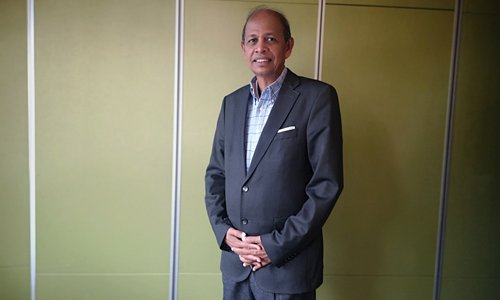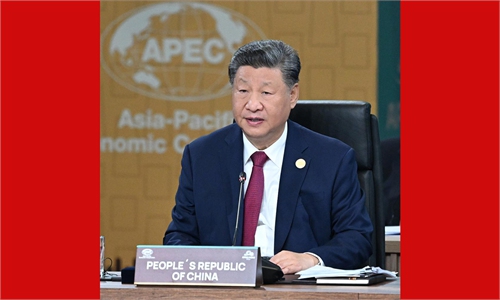China's readiness to host 2026 APEC reflects strong commitment to goals and objectives of APEC, says Malaysian official

President of the Malaysia-China Friendship Association: Dato' Abdul Majid Ahmad Khan Photo: Xie Wenting/GT
China's readiness to host the 2026 APEC reflects its continued strong commitment to the goals and objectives of APEC, Dato' Abdul Majid bin Ahmad Khan, president of the Malaysia-China Friendship Association and former Malaysia's ambassador to China, said in a recent interview with the Global Times. "China will be the right choice, as it can share its experiences on inclusive development, green transition, and open markets."China announced on Saturday that the country will host the APEC Economic Leaders' Meeting in 2026, marking the third time it has hosted the gathering since APEC's founding in 1989. The previous occasions were in 2001 and 2014.
Malaysia and China's robust economic partnership and infrastructure connectivity can serve as a model for Asia-Pacific Economic Cooperation (APEC), fostering regional cooperation and sharing of valuable development experiences. Their strong foundation in trade and investment synergy aligns with APEC 2024, underscoring China's pivotal role in regional integration and commitment to peace and prosperity, said Majid. The 31st APEC Economic Leaders' Meeting is currently underway in Lima, Peru.
The overarching theme for APEC 2024 is "Empower, Include, Grow," and there are three priorities: first, trade and investment for inclusive and interconnected growth; second, innovation and digitalization to promote transition to the formal and global economy; and third, sustainable growth for resilient development.
Majid said the theme of the 2024 APEC summit reflects a commitment to inclusive economic growth and sustainable long-term development for the Asia-Pacific region. To achieve the stated goals, leaders need to focus on strengthening open and inclusive trade policies to drive economic growth that benefits all sectors of society, reducing tariffs and barriers, and promoting adoption of emerging technologies and accelerating digital transformation.
Malaysia and China have laid commendable foundations for trade and investment synergy, Majid noted, which can be a model for the APEC framework. The economic partnership between the two countries has further strengthened this linkage through infrastructure connectivity and people to people interactions under the framework of the Belt and Road Initiative (BRI). "Malaysia and China can share their experiences with the APEC member economies. Both APEC and the BRI advocate stronger regional cooperation and integration. China's success in opening-up policies and green transformation can also be shared with APEC," he said.
"Malaysia has benefitted from China's success in green technology such as solar and hydro power, electric vehicles, artificial intelligence and automation in its national green transformation program. Collaboration in R&D, training, data centers and scientific exchanges have increased in recent years. It is expected that this cooperation will contribute to Malaysia's growth and prosperity as a win-win situation," said Majid.
Majid stressed that as APEC strives to build a more prosperous and equitable order, there are challenges from countervailing forces of anti-globalization and protectionism. To counter this, the summit must continue to advocate for and advance the Free Trade Area of the Asia-Pacific (FTAAP). "Leaders should be committed to open market values and inclusive trade. The FTAAP can help create a framework that aligns with existing regional agreements, integrate sustainable practices such as a green supply chain, and strengthen digitized trade and investment policies."
Majid expressed concerns that while green development has been embraced by member economies, the progress so far has been slow and uneven. A lack of resources and political will has hindered the green transformation, so the summit needs to prioritize strategies for promoting environmentally responsible growth, by supporting green technologies, encouraging sustainable business practices and transitioning to low-carbon energy.
"Leaders need to push for stronger collaboration on climate adaptation and mitigation, as well as initiatives to promote renewable energy, protect biodiversity and reduce waste. Asia-Pacific must place itself as a global leader in responsible and sustainable development," he said.
Majid believes that as a member of the Asia-Pacific community, China has a crucial role to play in advancing the vision of APEC 2024 for empowerment, inclusion and growth that benefits all in the region. China has been exemplary in areas such as inclusive trade and investment, innovation and digitalization and sustainable development.
China's development theme overlaps with that of APEC 2024 and China's pivotal role in initiatives such as the BRI and active participation in APEC demonstrate its commitment to fostering regional integration and development, promoting peace, prosperity and shared growth in Asia-Pacific, he noted.


